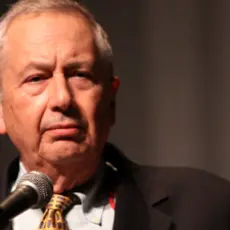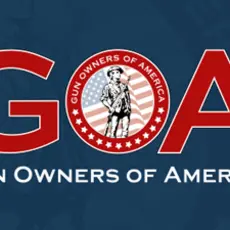Rolling Stone is out today with a lengthy profile of Gun Owners of America executive director Larry Pratt, who, as we we frequently note, continues to hold a large amount of sway among Republicans in Congress despite his ongoing record of extremism.
Reporter Alexander Zaitchik digs into Pratt’s history of allying with anti-government militia groups and the anti-Semitic, racist Christian Identity movement. On the afternoon of the Oklahoma City bombing, Pratt implied that Timothy McVeigh had been doing God’s work against a government that was behaving “like a beast.”
Zaitchik also notes Pratt’s early forays into radical Religious Right activism, including calling for a quarantine of AIDS victims in the early days of the epidemic.
The whole profile is worth a read, but here are a few excerpts.
Along with his gun work, Pratt was involved during the Reagan years in a wide range of social and foreign policy issues. He was a member of the Council for National Policy, a think tank bringing together leading conservative figures to generate policy for the new administration. In 1980, he founded the Committee to Protect the Family Foundation, which raised money for anti-gay campaigns and assisted the anti-abortion group Operation Rescue with legal defenses. In 1986, during the depths of the AIDS crisis, Pratt bought ads around the country highlighting a D.C. law forbidding health insurance companies from denying coverage and raising rates for people who test positive for HIV. "We don't think AIDS should have civil rights," Pratt told the Los Angeles Times. "The law is a dangerous and outrageous precedent for other wacko legislators to follow. [Those who support it should be] held accountable for voting to support homosexual privileges."
The following year, Pratt called for the quarantine of people suffering from AIDS. "Our judges coddle criminals instead of caring for the victims of crime," he wrote in a Family Foundation fundraising letter. "They've chased God out of our schools, defended abortions…and now they are trying to infect us and kill us with strange and horrible diseases."
…
The bloodshed and the armed standoff [at Ruby Ridge] that followed catalyzed groups across the far right into action. This activity would soon produce a national militia movement for which Ruby Ridge functioned as a modern-day Alamo. The most important event in this development was a three-day meeting convened in October 1992 by Christian Identity leader Pete Peters. Christian Identity maintains that Aryans are the true Jews, that blacks are a pre-Adamic subhuman species, and that a race war is coming, after which whites will establish a "Christian government." These were the baseline ideas uniting the 150 far-right leaders who answered Peters' call to action at a YMCA hall in Estes Park, Colorado. Among those present was Larry Pratt. According to media reports, Pratt railed against the 14th Amendment and delivered one of his favorite lines: "The Second Amendment ain't about duck hunting."
According to Leonard Zeskind's report from the conference, published in a November 1995 Rolling Stone story, Pratt's fellow speakers consisted mostly of extremists with little mainstream profile or Washington connections, people like Aryan Nations leader Richard Butler and Texas Klansman Louis Beam. Pratt represented a link between these worlds and the rightward edge of the conservative establishment. Pratt's presence, wrote Zeskind, "signaled the transformation of the gun lobby. Organizations like GOA or even the National Rifle Association, which were devoted to the single issue of firearms, would become the leading edge of a far right, multi-issue assault on government institutions and democratic rights. The gun lobby would be at the center of a web of right-wing warriors."
…
In militia circles, the [Waco] siege confirmed the worst suspicions about the federal government. The links between the militia scene and the gun groups had deepened to the point where NRA fundraising letters echoed the language of extremist publications on the radical right. In one 1995 letter, NRA executive vice-president Wayne LaPierre described ATF officers as "jack-booted thugs" in "Nazi bucket helmets." But the NRA stopped short of supporting the Christian Identity lawyer Kirk Lyons, who was representing multiple victims of Waco. Pratt and the GOA had no such compunction and donated tens of thousands of dollars to Lyons's white supremacist organization CAUSE (short for the Aryan bastions of Canada, Australia, the United States, South Africa and Europe), "Not $50,000 — but a lot of money for us," Pratt told Rolling Stone in 1995.
For many, the gun scene's rhetoric of an "evil" and "fascist" government was immediately rendered in more sinister shades when Timothy McVeigh detonated a truck bomb under Oklahoma City's Alfred P. Murrah federal building on April 19, 1995, the second anniversary of the Waco siege. Former president George W. Bush spoke for many when he cancelled his NRA membership in the bombing's wake, citing LaPierre's incendiary rhetoric.
On the afternoon of the City bombing, Pratt was in Washington, D.C., demonstrating in front of FBI headquarters for its role in the Waco tragedy. Three days later, Pratt spoke before a gathering of 600 Christian Identity adherents and assorted radicals convened by Pete Peters at the Lodge of the Ozarks in Branson, Missouri. Pratt addressed the "Biblical Mandate to Arm" and seemed to justify McVeigh's act of terror, at the time the bloodiest in American history. According to an account by Michael Reynolds in Playboy, Pratt told the gathered, "The government behaves as a beast. It did in Waco, and we have somebody, whoever it might have been, whatever group it might have been, assuming they can't rely on the Lord to take vengeance."





